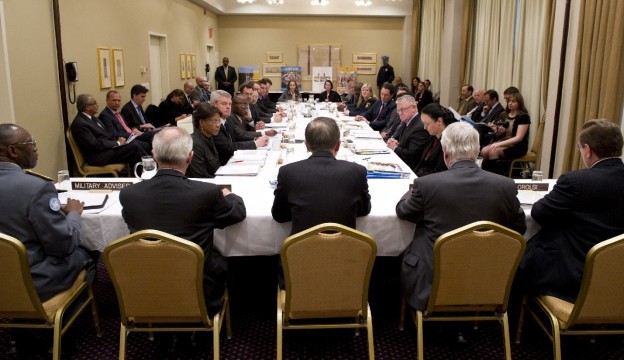United Nations Macro Mediation Mapping Project

Overview
International mediation is a highly-specialized, demanding job that requires a unique skillset and extensive professional network. While only a small number of individuals use the label of “mediator” to describe their work, professionals in a wide range of settings – academic institutions, NGOs, think-tanks, etc. – may engage in mediation or negotiation as part of other projects or agendas. Vital to effective conflict engagement in these settings is entering with a current and informed sense of the various stakeholders, interveners, and related initiatives happening on the ground.
Although the United Nations and the Department of Political Affairs have concentrated their efforts to provide the Secretary-General, his Representatives, and UN partners actively engaged in peacemaking efforts with general advice and support, information about current mediation networks for effective conflict engagement and intervention is scarce, guarded and piecemeal at best. At the same time, online resources such as UN Peacemaker, which not only include extensive databases of peace agreements but also guidance material and information on the UN’s mediation support services, are becoming an essential tool for actors that are actively engaged in peacemaking efforts globally, including Member States, regional organizations, civil society, non-governmental organizations and national mediators.
To address the need for more online resources on current mediation networks, and capitalizing on already existing online resources and databases, AC4 has been conducting expert interviews and desk research to piece together information about how individuals in these settings gather and use information to advance their work in conflict-affected areas.
Publications
Research Proposal: Expanding Online Mediation Support Tools: Mapping Mediation Networks for Effective Conflict Engagement and Intervention
Putting the Peaces Together: Introducing a Situated Model of Mediation
By Peter T. Coleman, Katharina Kugler, Christianna Gozzi, Kyong Mazzaro, Nora El Zokm, and Kenneth Kressel (in progress)
Although academic research on mediation has progressed considerably over the last few decades, it still faces considerable challenges to its practical relevance. Today, the findings from research on mediation present a fractured, piecemeal understanding of what constitutes “effective mediation” and how to achieve it. Research is typically either micro (e.g., mediator style) and decontextualized from the broader system of conflict management, or macro (e.g., case comparisons) and disconnected from mediator decisions and action. As a consequence, many models of mediation practice are not derived from sound theory or evidence-based research (Coleman, 2011). Knowledge generated within academia oftentimes does not reach practitioners and valuable field experiences and practices rarely inform academia – impeding mutual learning and development (Honeyman, 2009; UN Report, 2012).